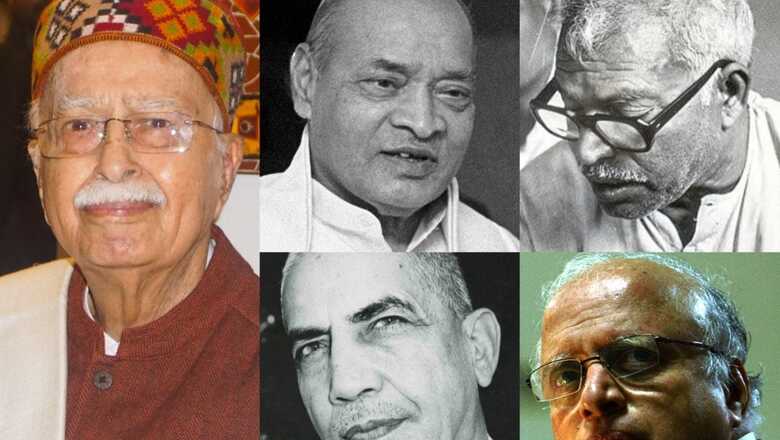
views
Prime Minister Narendra Modi on Friday took to X to announce that the Bharat Ratna, India’s highest civilian honour, would be conferred on former prime ministers PV Narasimha Rao and Chaudhary Charan Singh and agricultural scientist MS Swaminathan.
The announcement comes close on the heels of the government also bestowing the honour on veteran BJP leader LK Advani and former Bihar chief minister Karpoori Thakur. At five, one more than the four announced in 1999, this is the maximum number of Bharat Ratnas announced for a year.
Here’s a look at the five stalwarts who have been awarded the Bharat Ratna in 2024:
PV Narasimha Rao:
Rao was born in 1921 in Andhra Pradesh’s Karimnagar and studied at Osmania University in Hyderabad, Bombay University, and Nagpur University. A Congress leader, he was prime minister for a full five-year term during 1991-96 and is widely recognised for ushering in economic reforms.
Paying rich tributes to Rao, who passed away in 2004, PM Modi said he served the country extensively in various capacities as a distinguished scholar and statesman. He said Rao is equally remembered for the work he did as the chief minister of Andhra Pradesh, a Union minister and as lawmaker in Parliament and assembly for many years. “His visionary leadership was instrumental in making India economically advanced, laying a solid foundation for the country’s prosperity and growth,” Modi said. “Narasimha Rao Garu’s tenure as prime minister was marked by significant measures that opened India to global markets, fostering a new era of economic development,” he added.
Rao’s admirers have long argued that he has not been given his due by the Congress due to his less than warm relations with the Nehru-Gandhi family, a point often made by BJP leaders too. As the country’s first and only full-term prime minister from south India, Rao occupies a special place in the region.
Charan Singh:
Born in Uttar Pradesh’s Meerut in 1902, Charan Singh served as the prime minister from July 28, 1979, to January 14, 1980. He was first elected to the Uttar Pradesh Legislative Assembly in 1937 from Chhaprauli. He represented the constituency in 1946, 1952, 1962 and 1967.
A champion of farmer causes, Singh was a Jat leader from western Uttar Pradesh and one of the pioneers of anti-Congress politics at a time the party was a hegemonic political force. Honouring Singh, PM Modi said: “It is our government’s fortune that Singh is being honoured with the Bharat Ratna and it is dedicated to his incomparable contributions to the country. Be it as an MLA, as Uttar Pradesh chief minister or the country’s home minister, he always speeded up the nation-building exercise and also stood strongly against the Emergency.”
The honour for Singh comes at a time the RLD, led by his grandson Jayant Singh, is believed to be in talks with the BJP for an alliance for the Lok Sabha polls, expected in April-May. Singh died in 1987.
MS Swaminathan:
Popularly known as the Father of Green Revolution in India, Swaminathan was born in 1925. He obtained a BSc degree in Zoology from the Maharajas College in Thiruvananthapuram, and also in Agricultural Sciences from the Coimbatore Agricultural College.
Swaminathan had played a key role in developing high-yielding varieties of paddy that enabled India’s farmers to produce more yield. He had the vision to rid the world of hunger and poverty. An advocate of sustainable development and preservation of bio-diversity, he has been described by the United Nations Environment Programme as “the Father of Economic Ecology”.
PM Modi said it is a matter of immense joy that his government is conferring the Bharat Ratna on Swaminathan in recognition of his monumental contributions to the nation in agriculture and farmers’ welfare. “He played a pivotal role in helping India achieve self-reliance in agriculture during challenging times and made outstanding efforts towards modernising Indian agriculture. We also recognise his invaluable work as an innovator and mentor and encouraging learning and research among several students,” he said.
Swaminathan’s visionary leadership has not only transformed Indian agriculture but also ensured the nation’s food security and prosperity, the prime minister said, noting that he knew him closely and always valued his insights and inputs. The agronomist passed away last year.
LK Advani:
The architect of the Ram Mandir movement, Advani had been the BJP national president from 1986-90, 1993-98, and 2004-05. He was first the Home Minister and later, the Deputy Prime Minister in the former Prime Minister Atal Bihari Vajpayee’s cabinet from 1999 to 2004.
Advani became the face of the Ram Janmabhoomi movement in the late 1980 that shaped, and continues to define the saffron party’s electoral and political fortunes. Together with Vajpayee, he went on to build the BJP brick by brick and orchestrated its steep rise in the 1990s. In the late 1980s and the 1990s, he focused on building the BJP into a national political force and the results reflected in the 1989 General Election. BJP bounced back from 2 seats in 1984 to 86 seats in 1989.
A 10-term parliamentarian, Advani projected himself as the PM candidate in the 2009 elections, despite many leaders unsupportive of the move. The BJP suffered a resounding defeat to the Congress-led UPA in the 2009 polls and impacted Advani’s stature and position within the party. The 96-year-old leader was made a member of the ‘Margdarshak Mandal’ after the BJP won the election under Narendra Modi in 2014.
Karpoori Thakur:
Born in Bihar’s Samastipur District in 1924, Karpoori Thakur served as the chief minister of the state twice, first from December 1970 to June 1971 and then from December 1977 to April 1979. Dubbed “Jan Nayak” by many in the state, his recognition met a long-standing demand of Bihar Chief Minister Nitish Kumar and his Janata Dal United.
Prime Minister Narendra Modi said he was “delighted” that the “great Jan Nayak Karpoori Thakur Ji” will be conferred the prestigious award “and that too at a time when we are marking his birth centenary”. “This prestigious recognition is a testament to his enduring efforts as a champion for the marginalised and a stalwart of equality and empowerment,” PM Modi said in a post on X.















Comments
0 comment